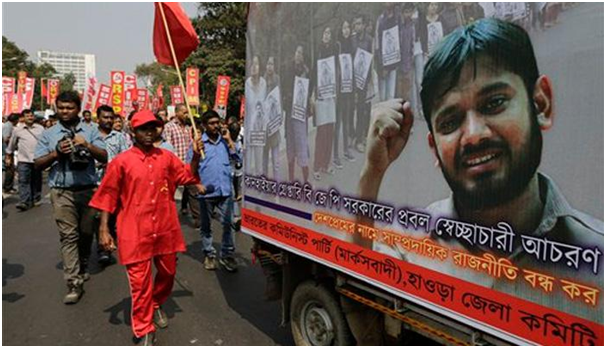This is Not the Time for Public Intra Left Squabbles

NEW DELHI: The united struggle of the JNU community against the central government and RSS gang up accusing us of anti-national activities has been outstanding. But there has been some controversy. There was a perception that Kanhaiya didn't critique the 1984 pogrom adequately, but actually defended it as some have claimed. It has been admitted that he said that "it was merely a mob violence." This is clearly not a defence of 1984, though pogrom, communal assault, etc would be more apt. So to say that Indira Gandhi's killing was not a factor in the pogrom is also palpably wrong. In fact it was the major factor.
I was in Delhi in October-November 1984. It rapidly became clear that Indira Gandhi's assassination was the trigger for the anti-Sikh pogrom. In Rajiv Gandhi's presence, Congressmen shouted slogans like "Khoon Ka badla Khoon se lenge." It became evident that municipal records were collected so that Sikh properties could be identified. In a number of cases where neighbors in affluent colonies switched name plates to protect the Sikhs, they were caught out through the records that the rioters had as early as November 1st morning.
The same happened in industrial areas where Sikh factories were targeted. The police was hardly to be seen. The role of the police in Trilokpuri where the largest number of Sikhs in one place were killed, about 350, the killings allegedly occurred in the near proximity of the local SHO. The massacre was stopped by the Army which patrolled the Delhi streets for weeks afterward. Otherwise the death toll would have been even higher.
This level of preparedness and organisation could not be spontaneous. It was clearly not a "riot" but a "pogrom."
The cover up was also manipulated. Inquiry after inquiry was lame, scratched the surface of evidence about the events, and acquitted a disproportionate percentage of the accused, with many accused not even being questioned or cross questioned. The generally accepted death toll of about 2,000 dead does not include killings in other cities.
I don't think we should differentiate too much between 1984 and 2002. The first did have a lot of political impact. The killing of Indira Gandhi was propagated as a martyrdom of a great leader, who despite being warned by intelligence, decided to trust her Sikh bodyguards to show her faith in the Sikhs.
This hagiography worked. Otherwise how do we explain the sharp decline of BJP seats to only four? The BJP did not join in 1984, and paid the electoral price. But in both pogroms,q984 and 2002, the state machinery played a major role. In sum, a government sponsored cover up. Not the first, but this happened in the capital. A tragedy and a shame. No hope of belated justice.
This said there have been some intra-Left debates on Kanhaiya's formulation on "mob violence" being the driving force in the Delhi riots as distinct from the pogrom of 2002 in Gujarat. Of course, in all riots/pogroms there is mob violence as there was in Godhra near Signal Falia close to the railway station, where the Muslims resisted fiercely. So Kanhaiya was not trying to defend the Congress as has been alleged. To call it a communal attack as before, is currently called a pogrom in line with international usage.
But, such issues should not deteriorate into sharp public criticism of the JNUSU President, picked up later by the media. We all make mistakes, some time or another. This is not the time to highlight one such mistake, which taken in the context of the speech in the Centre of Historical Studies, the India Today conclave, outside the HCU gates, and other venues, is not that significant. This is not the time to have public intra-Left debates on relatively minor matters. The Left, as most agree must hold together and strengthen Left unity. Without that we cannot prevail.



